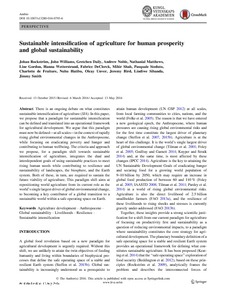Resource information
There is an ongoing debate on what constitutes sustainable intensification of agriculture (SIA). In this paper, we propose that a paradigm for sustainable intensification can be defined and translated into an operational framework for agricultural development. We argue that this paradigm must now be defined—at all scales—in the context of rapidly rising global environmental changes in the Anthropocene, while focusing on eradicating poverty and hunger and contributing to human wellbeing. The criteria and approach we propose, for a paradigm shift towards sustainable intensification of agriculture, integrates the dual and interdependent goals of using sustainable practices to meet rising human needs while contributing to resilience and sustainability of landscapes, the biosphere, and the Earth system. Both of these, in turn, are required to sustain the future viability of agriculture. This paradigm shift aims at repositioning world agriculture from its current role as the world’s single largest driver of global environmental change, to becoming a key contributor of a global transition to a sustainable world within a safe operating space on Earth.



